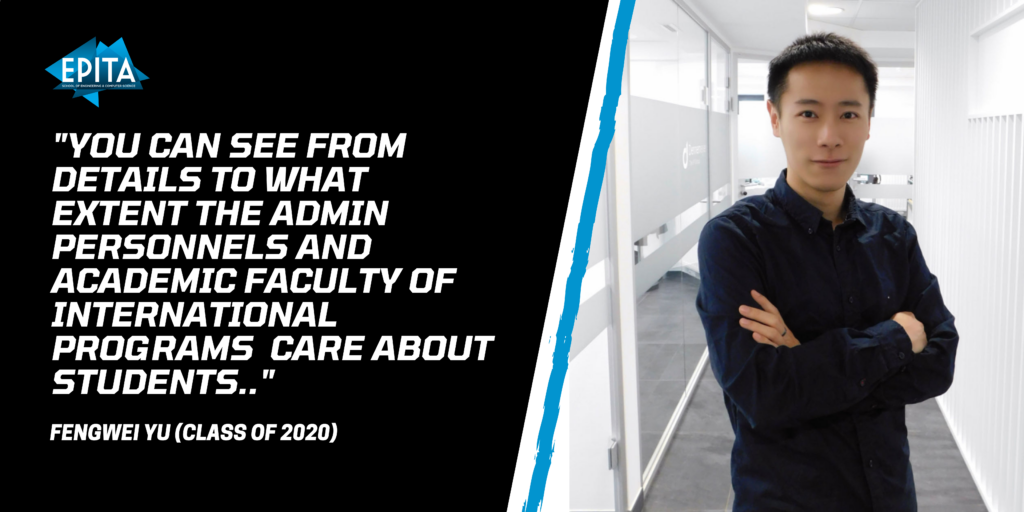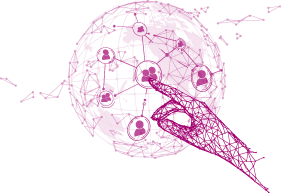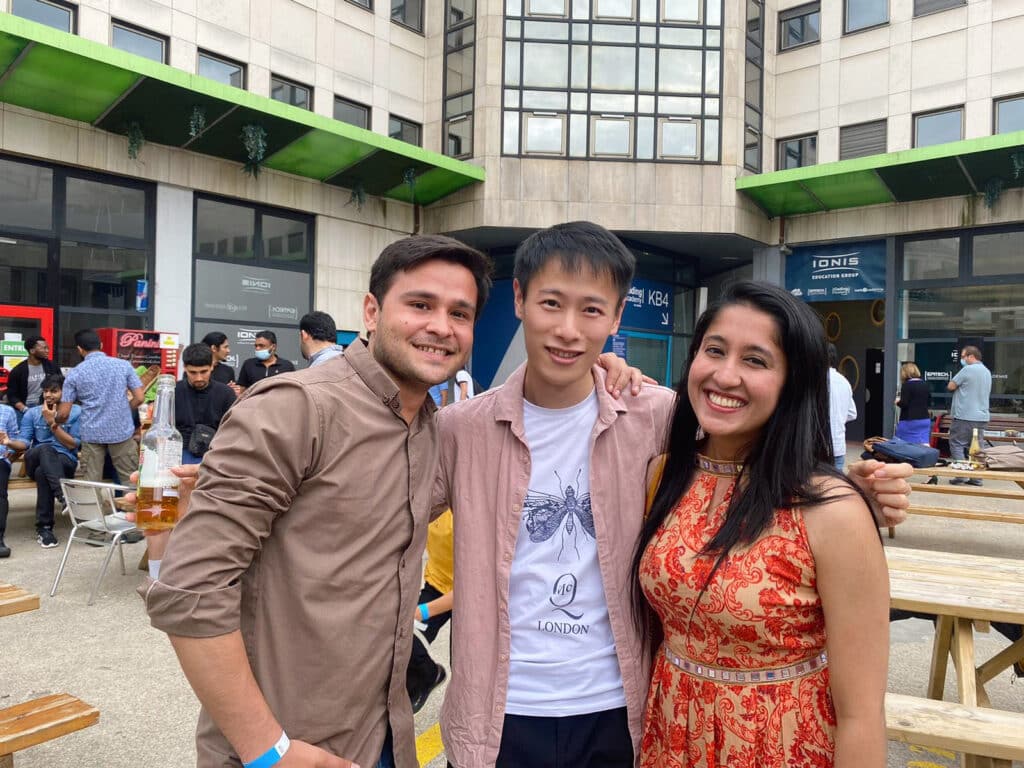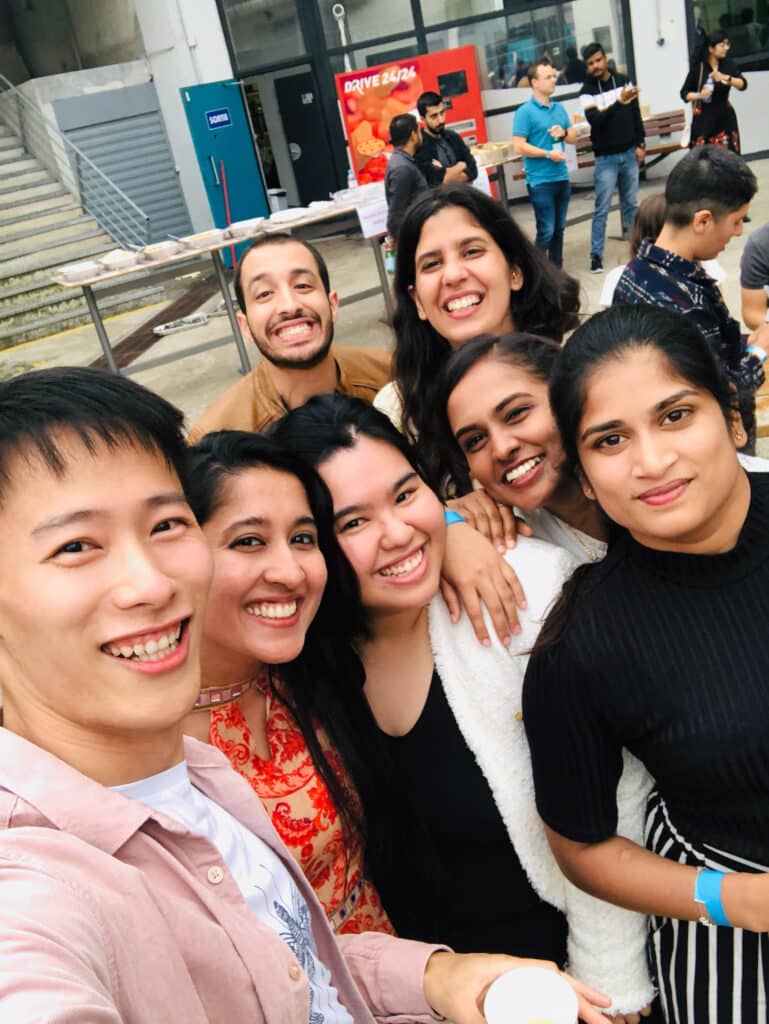From IT Support to Strategic Management: Fengwei YU (EPITA Class of 2020)’s Quest for Holistic Expertise in the Business World
Embarking on a journey in academia often parallels a quest for self-discovery, where one seeks to refine their skills and align them with their evolving passions. Fengwei YU, a graduate of EPITA’s Master of Science in Computer Science – Innovative Information Systems Manageemtn program (Class of 2020), epitomizes this narrative through his transition from IT support roles in global enterprises to honing a nuanced understanding of Information Systems Management.
His journey from Shanghai to Paris and then to Luxembourg was not merely a geographical shift but a transformative odyssey fueled by a desire for holistic expertise in the realm of IT. Through EPITA’s Innovative Information Systems Management (i-ISM) specialization, Fengwei’s trajectory took an invigorating turn, providing him with the tools to navigate the intricate interplay between technology and business objectives. Let’s delve into his interview, where each chapter unfolds a tale of resilience, learning, and professional growth.

What was your academic and professional experience before EPITA?
I graduated from a Bachelor of Software Engineering and started working in IT support in L’Oreal in Shanghai for two years. Afterwards, I switched into another software company to take up a more technical role and managed the software solution PLM, a system used to manage the live performance of fashion design. I have learnt a lot of IT and technical skills in this company.
Three years later, I had the feeling that what I had learnt was not enough. I started to search for opportunities of further studies and browsed an education forum. I found EPITA there, consulted their website, and have gathered information about their IT specializations. I found the i-ISM specialization very interesting and decided to apply for the program.
Why did you choose to study at EPITA?
I came across an advertisement of a live broadcast about EPITA on Wechat. After a few days, I searched the information about EPITA such as their teaching method, the curriculum of the specializations, and career opportunities on the internet. At that moment, I was not sure which direction I would like to head in. Then I read several blog articles on EPITA website, which helped me in choosing EPITA. In fact, I also found other IT schools in Paris, but I didn’t start the applications for them.
Why did you choose the specialization Innovative Information Systems Management (i-ISM) after having graduated from a Bachelor’s degree in software engineering?
My previous job was more about IT support, and then about enterprise application support such as ERP and CRM. I actually haven’t really developed my career in software engineering, even though I did make some websites for families and friends or freelancing from time to time. That’s why I didn’t want to continue the pathway of software engineering. I already had enough software engineering and coding classes during my Bachelor’s studies at the university, and found out that it was not really what I would like to pursue since I don’t have a passion for coding even though I am good at it.
I had work experience in IT support in L’Oréal. The purpose of their IT support has been to support business and to generate more profits. The IT Department develops software for communication and sales department so that they can achieve the business goals. They focused more on enterprise software, and I’ve always liked these parts. Therefore, the balance between the technical and soft skills in the curriculum of the i-ISM specialization have suited me perfectly.
What courses did you enjoy the most? How does your study relate to your career?
During my work experience prior to EPITA, there were some IT knowledge I didn’t know, or I didn’t have the technical vocabulary to explain. After the training at EPITA, I was able to name and talk about it, and have a comprehensive knowledge to be able to deal with related issues. For example, the project management class was very helpful and useful for me. During my previous work experience, when I had a project to manage, there was a project team, and what I knew were the tasks to complete. After having taken the classes at EPITA, I was aware of the entire project cycle, from the project initiation phase to the completion phase, as well as the details such as costs and benefits management.
Another course Corporate Finance equipped me with the capacity to deal with technical work in finance. I had to be involved in developing software to solve financial issues, such as how to calculate profits. I had more technical jargons in finance. For example, I was able to read the spreadsheet of financial department.
The Marketing class is also useful too. It helped me to understand better from the business point of view the assistance that IT Team needed to offer to the salespeople so that they can implement CRM and to land a deal.

What is your favorite memory from studying at EPITA?
I arrived at EPITA during the COVID period, and due to this epidemic, we had to take classes on-line every day in the first semester. After a while, we were allowed to go to campus to have on-site classes from time to time. Everybody was happy to see the teachers and classmates face-to-face, especially our academic advisor Mr. Olivier BERTHET. He was not living in Paris, and he had to travel to Paris to deliver classes on site.
Apart from this memorable moment, the annual barbecue was one of my favorite memories. Students of all specializations had the opportunity to gather. Almost all our teachers participated in the BBQ too. There was good music, with participants dancing and laughing, while enjoying the delicious food. It was really the most marvelous moment.

As you studied at EPITA during the exceptional COVID period, what student support have you received at EPITA?
EPITA offered the International Student Pack that includes the services to help us find accommodation before our arrival and pick us up at the airport. Imagine I crossed half the planet and flew from Shanghai to Paris! When I arrived, I was already exhausted. And then there was a driver to pick me up and bring me to my apartment. I felt super welcome during my first day in France!
During the Welcome Days, the International Programs Department has invited a bank partner to open bank accounts for students on campus and assisted us in applying for a Carte Vitale. That was very helpful. Before I came to EPITA, I read a lot of articles on social media about how Chinese students struggled with the social security, bank cards, and finding apartments in Paris. Thanks to EPITA, I experienced none of those difficulties. I settled down in France smoothly.
Throughout the studies, due to COVID, all the classes were moved to Teams very quickly. Not only the International Programs Office reacted promptly, but also the teachers. They utilized a wide range of online tools, answer quizzes, and made the teaching more interactive to retain the attention of students. For example, at the beginning of the classes, the teachers sent the students a quiz, which they had to answer them at the end of classes. This ensured that students concentrated and mastered the skills despite the difficult times.
With the help of International Programs Office, no matter our issues, such as class arrangements due to the lock down or changes in government policy, the International Program Office adapt to the changes very quickly. For example, one day, the government announced a change of lock-down policy, the next day, I have already received an email from the International Programs Office about this information. I can see how much work was behind it. You can see from these tiny details to what extent all the administrative personnels and academic faculty they care about students. Other schools might not care about what students learnt behind the camera, but EPITA cares about students’ health condition and whether they truly learned something.

Can you tell us about your internship?
Two to three months after the classes, I have obtained three internship offers, one as Data Engineer at Nestlé, one at Estée Lauder to deal with data and build API, and the last one as Solution Engineer in the education company Le Wagon. At that moment, I didn’t know which one to choose. I had a discussion with my academic advisor about the job description of the two internships and which suited my academic pathway better. In the end, I chose Le Wagon which trains students for IT bootcamps.
In Le Wagon, I worked in B2B Department and my job was to convince the companies to train their employees. This job role required me to work closely with sales, marketing, and engineering team. I acted as a bridge between them to suggest customized solutions to potential clients.
I had some experience in working for the post-sales side, but this internship is more about pre-sales side. During the pre-sales stage, the customers had a lot of technical questions. I was responsible for collaborating with salespeople so that they can answer the technical questions of the potential clients. After the client signed the agreement, and we started to deliver the project and involved the programming part, I was the point of contact with the engineering team to customize things for the clients. This part was very interesting for me as I was the link between different departments and ensures the delivery of the successful projects. Even I didn’t have a lot of pre-sales work experience, the skills that I have learnt at EPITA helped me to succeed in this internship.
How have you developed your career after your internship?
After the 6-month internship, le Wagon has offered me a full-time position (CDI in French), and so I stayed in the same company. Almost 80 percent of that job role concerned the business side. During the end-of-year review, I told my manager that I had the impression that I haven’t fully utilized my IT and technical knowledge and skills. The technical questions of the clients were very simple and easy. I didn’t use much of what I learnt at EPITA nor my IT knowledge. From day to day, I didn’t get my hands dirty to implement something. This was one of the reasons why I started looking opportunities elsewhere.
In the beginning of last year, I had obtained two job offers, of which one of them was IT Operations Specialist in a global IP law firm Dennemeyer based in Luxembourg, and I accepted. I have then moved to Luxembourg. In this company, we develop software solutions for clients to manage the IP rights such as trademarks and patents. We initiate the projects for the clients, guide them with the implementation and the configuration of the software. After the project goes live, we monitor its performance and troubleshoot any technical issues. Now I finally found the balance between the technical and business parts. The company has its own consultants and salespeople to answer technical questions using the prepared documentation.
What advice would you give to students looking to get into your industry?
If you feel stuck in your current career development or IT domain, and if you wish to experience something else, opt for the i-ISM specialization at EPITA. It would broaden your knowledge not only in technical but also in general corporate domain. It helps you understand how different departments in an organization cooperate with each other to focus on and achieve the business goals.
In the business world, there are a corporate level of objectives. And then each department has their own goals. You must be able to know how each department work together to attain the final goals. The i-ISM specialization will enable you to take a macro view of the organization or business, on top of the programming, business intelligence and simple data science courses. This is something you could not learn from the Software Engineering and Data Science & Analytics specialization. If you wish to help businesses to become more innovative in the digital world, go for i-ISM!

